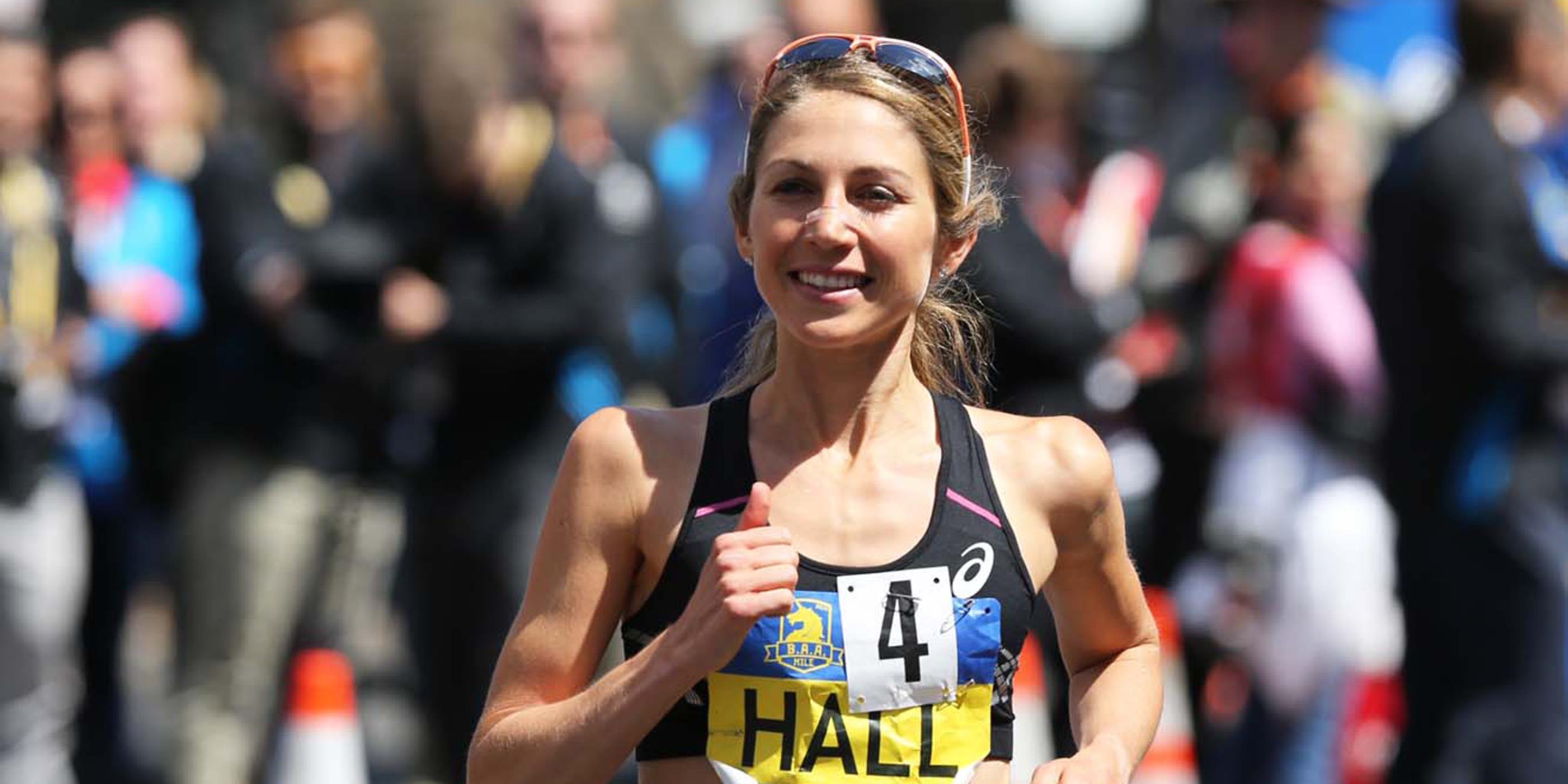The elite distance runner is gearing up to make an impact at the New York City marathon.
This coming Sunday, November 6, 33-year-old Sara Hall will join a world-class field at the New York City Marathon, which will feature defending champion Mary Keitany of Kenya (as well as marathon rookie Olympic triathlon gold medalist Gwen Jorgensen). It will be Hall’s fourth marathon.
Following her 10th-place finish of 2:31 at the Chicago Marathon in 2015, Hall went on to compete at the U.S. Olympic Trials in Los Angeles in February, though she dropped out citing muscle cramps as a culprit. Two months later, Hall bounced back from the disappointing performance by finishing 12th at the London Marathon with a personal best time of 2 hours and 30 minutes.
What she’ll be capable of at the New York City Marathon remains to be seen, but the build up to this point—running twice a day, seven days a week in Redding, California, where she is raising her four Ethiopian-born daughters—has her feeling confident and ready to push her boundaries.
“The NYC marathon is all about competing. There’s an incredible field this year,” Hall said. “I want to use them to get the most out of myself.”
Hall shares about the preparation that will help her display her talent against the world’s best.
What’s been the most important thing you’ve learned about racing 26.2 miles since yourmarathon debut?
Hall:I’ve learned that I want to avoid races that have a chance at being over 80 degrees! I have not raced well in two marathons where I encountered that, but have loved my other two that were more mild conditions.
What’s been challenging about training at an elite level while balancing time with your four daughters?
Hall:It’s challenging to always have the energy to do fun things with them. I still do it, but it takes a conscious effort, and I know in the back of my mind I’m not recovering as well as I should be. But it’s worth it to me, and I’m thankful I’ve been able to pursue my career and run the fastest I have while being a mom.
What’s typical day of training for you?
Hall:I usually run twice a day and alternate hard workouts and easy recovery runs. One day is typically at least 21 miles, and one day is 6 to 8 miles. I try to space my hard workouts with two easy days, but sometimes I take only one when I am absorbing the work well. I run between 14 to 15 miles a day, averaging about 100 to 110 a week.
What’s the role of strength training as part of your marathon prep?
Hall:It’s mostly core work and correctional exercises similar to physical therapy prescribed by my therapist, John Ball of Maximum Mobility chiropractic.
Has your training shifted specifically for the New York City course?
Hall:Yes, I have tried to really embrace hills! My last few marathons were flat courses, and I did most of my long tempos on a flat bike path, but I’ve made sure to insert hills late into my long runs and long tempos so it’s similar to what I will encounter on the course.
What’s your expectation for the NYC Marathon?
Hall:There are no pacemakers; it is not known to be the fastest of courses, but it’s an incredible platform, arguably one of the best. My goal is to be the best “me” I can be out there.
What shoe will you race in?
Hall:I’ll race in the ASICS Gel-Hyperspeed. It’s the shoe that Ryan (Hall, her husband) wore when he ran the fastest ever half marathon and marathon in American history so it’s good enough for me!
Breakdown your nutrition routine. What does your diet emphasize?
Hall:I start my day with a large pancake made of teff flour, an Ethiopian super grain, and Muscle Milk, which has easily-digesting protein. I get in a snack after training to promote recovery. I eat a lot of Wild Alaskan seafood like salmon and halibut, which have high-quality protein as well as fish oil.
What are three staples in your fridge?
Hall:Wild Alaskan salmon, organic chocolate Muscle Milk and almond butter.
What’s your favorite meal you like to cook?
Hall:Alaskan halibut enchiladas with tons of green sauce. My kids love them and think I’m a culinary genius.
How do you fuel during a race?
Hall:Cytomax sits really well in my stomach so I’m able to take in 100 calories of the powder mixed with eight to 10 ounces of water every three miles. I practice this in training so I know it will work in the race.
What does your recovery routine consist of?
Hall:Getting in some carbs and protein within 30 minutes of finishing my run as well as plenty of water or Cytomax. The quicker they can be digested, the better. Then I try to stay off my feet as much as possible before my kids come home. I do a lot of self-massage with a variety of tools, like a softball and a foam roller. I love soaking in a warm Epsom salt bath to ease tight muscles.
What’s a piece of advice from Ryan about racing a marathon that’s most benefited you?
Hall:Ryan has mentored me in the marathon in every aspect the last few years. Any success I have I owe it mostly to him. It has been absolutely essential to have his help—from the training to the mental component to talking me through the process. He is my secret weapon. A lot of his advice has to do with patience and working the last part of my long efforts—I have a tendency to be aggressive early.
Post-NYC Marathon, how will you decompress?
Hall:The day after I will be putting on a Princess Jasmine birthday party for my nine-year-old and helping to get my high schooler ready for her section cross country championships, among other things! But that’s about it!
